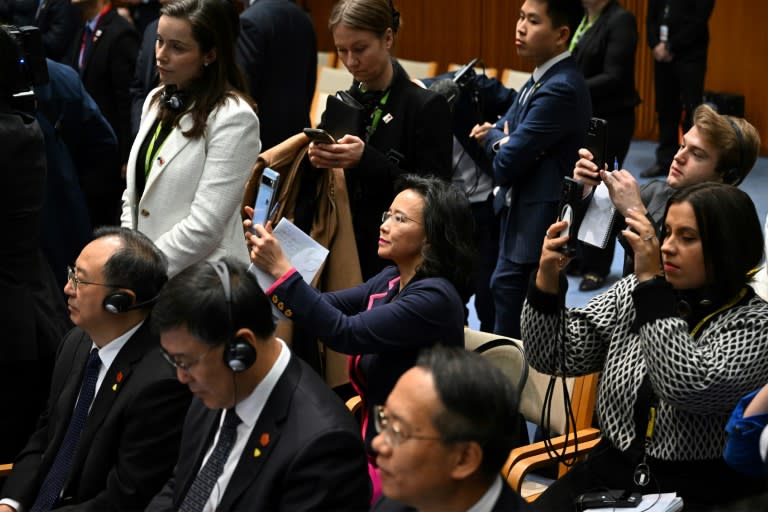Australia flags concern over 'ham-fisted' China diplomats

Australia voiced concern Tuesday about the "ham-fisted" actions of two Chinese diplomats at a media event, tarnishing a highly touted visit in which Premier Li Qiang has sought to celebrate trade and friendship.
China's second-most powerful man has posed in front of giant pandas, warmly toasted Australian wine, and highlighted the need to peacefully work through "differences" during his rare trip to Australia.
But the carefully choreographed tour briefly unravelled during a signing ceremony inside Australia's parliament on Monday, when two Chinese diplomats appeared to shadow high-profile Australian journalist Cheng Lei.
Cheng returned to Australia in October last year after three years detained in China on opaque spying charges and has spoken unflinchingly of her bleak prison conditions.
Prime Minister Anthony Albanese criticised the "ham-fisted" behaviour, saying on Tuesday Australia had "followed up with the Chinese embassy to express our concern".
"When you look at the footage, it was a pretty clumsy attempt, frankly, by a couple of people to stand in between where the cameras were and where Cheng Lei was sitting," he told national broadcaster ABC.
"And Australian officials intervened, as they should have, to ask the Chinese officials who were there at the press conference to move."
Footage showed two Chinese diplomats hovering next to a seated Cheng, repeatedly ignoring requests to move from animated Australian officials.
Cheng said they "went to great lengths to block me from the cameras".
"And I'm guessing that's to prevent me from saying something or doing something that they think would be a bad look," she told Sky News Australia.
"But that itself is a bad look."
Albanese had told Li in closed-door talks just hours earlier that "foreign interference wasn't acceptable in Australia's political system".
- Lingering 'differences' -
The highest-ranking Chinese official to visit Australia since 2017, Li's visit shows the growing rapprochement between Beijing and Canberra after a years-long trade dispute.
"Of course, we all know that in the past few years, our bilateral relations also encountered some difficulties and twists and turns," Li said before departing Australia on Tuesday afternoon.
"But thanks to the joint efforts of both sides, the bilateral relations have been put back on the right track."
Asked about the Cheng Lei incident and Albanese's remarks on Tuesday, Beijing's foreign ministry spokesman said he was "not aware of the specific situation you mentioned".
"But I can tell you that as far as I know, the ninth China-Australia Annual Prime Ministers' Meeting and other activities have been held smoothly and achieved positive results," Lin Jian told a regular news briefing.
Premier Li ended his visit with a tour of a Chinese-controlled lithium refiner in Western Australia, a sign of his country's vast appetite for Australia's critical minerals.
Australia extracts 52 percent of the world's lithium, the vast majority of it exported as ore to China for refining and use in batteries.
It is a crucial ingredient in China's world-dominant electric vehicle industry.
China's involvement in the country's critical mineral industry is sensitive because of its dominance of global supply chains.
Despite the goodwill on show, both sides have acknowledged lingering "differences" -- a nod to diplomatic jostling in the Pacific.
"We won't always agree, and the points in which we disagree won't simply disappear if we leave them in silence," Albanese said.
Australia accused China last month of "unsafe and unprofessional" conduct after one of its warplanes allegedly fired flares in the path of a naval helicopter over the Yellow Sea.
It also said late last year a Chinese destroyer blasted Australian navy divers with dangerous sonar pulses.
sft-oho/pbt

